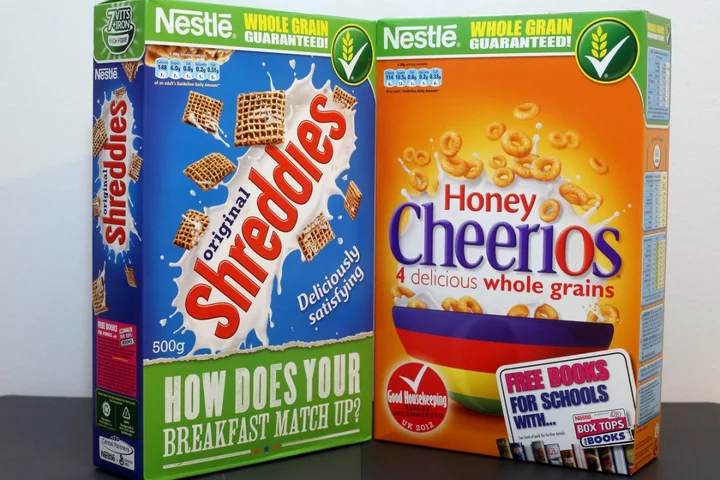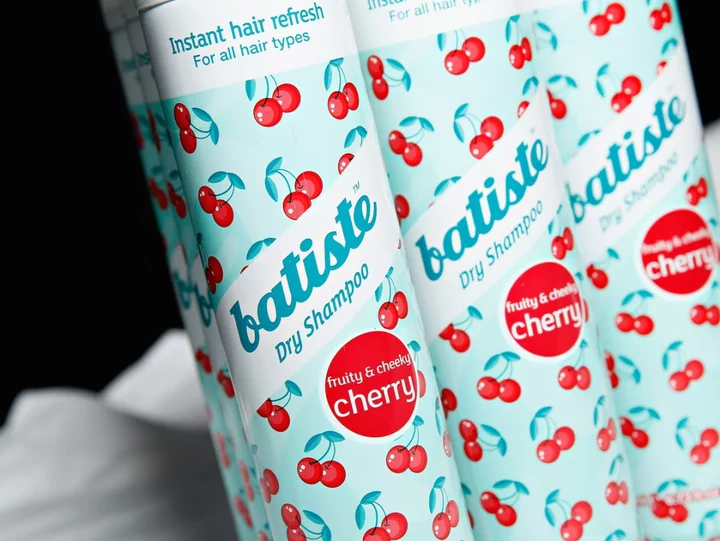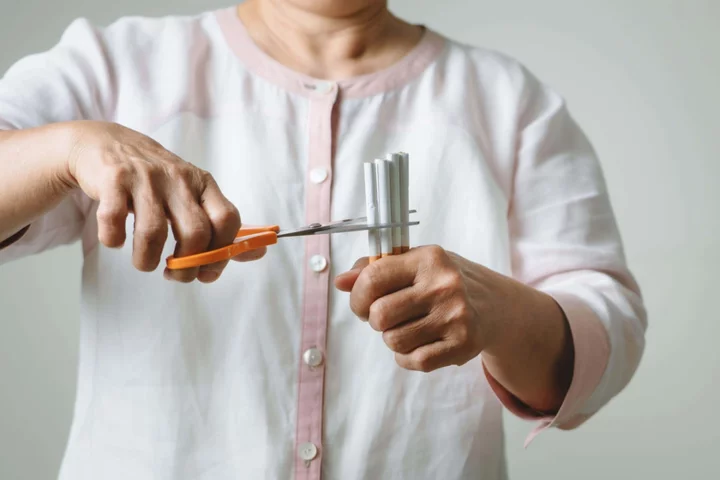
Parents of nine-year-old high school graduate reveal their number one parenting tip
David Balogun is a normal kid who competes in paper airplane races with his younger sister, Eliana and struggles to sit still, but he is also one of the youngest people in the United States to receive a high school diploma. In late January, Balogun graduated from Reach Cyber Charter School, which is a tuition-free online school in Pennsylvania. This month he will be starting classes at Southern New Hampshire University as a full-time student. Balogun and his parents, Ronya and Henry, spoke about what it was, and still is, like raising someone with a high intellect on CNBC Make It. The couple said they first tested their son’s intelligence when he was six years old. After that, they began to rethink any parenting philosophies they previously had. “There’s no book on it,” Ronya said. “You’ve got to develop a different mindset as a parent,” Henry added. “It’s not always easy when your son is asking you questions constantly. You have to keep answering the questions, because you don’t want to say, ‘Just leave me alone.’” Because of David’s unique circumstances, they’ve developed their own number one rule: When a system isn’t built for your child, don’t try to fix your child. Try to fix the system. Ronya said when David was in first grade, a regular classroom wasn’t working anymore, noting that sometimes his peers would listen to him more than the teacher. So they looked into their state’s gifted programs, which also proved to not be rigorous enough for their nine year old. In 2020, his parents enrolled him in Reach which allowed him to individualise his curriculum and take high school level classes. Although that didn’t come without challenges, including multiple calls to The College Board because David’s birthdate was too young to enroll in advanced placement exams. As for deciding on college, Ronya said she had to put her foot down mentioning she didn’t want David in a class filled with 20 year olds. “It’s a different adaptation that we don’t have in the United States of America yet. It’s very scary, you can’t find this,” she said. “Sometimes I can’t fix the system, but there are other unconventional choices and solutions to help lead my son through his journey to fulfill his dreams.” Trust is also a big part in parenting David, his parents said. They mentioned that, when he was learning specific skills like adding and subtracting negative numbers before he was taught, they had to believe he knew how. “I can’t tell him, ‘This is what you know,’ because I’m not in his brain,” Ronya said. “I have to trust him to be partially leading the way.” Although there are some boundaries in this trust, as David came home one day claiming he now knew where babies came from. His mother was able to briefly give him some information on reproductive anatomy before putting the conversation to a stop. “Mind you, at this moment, I’m talking to a six year old,” Ronya said. In terms of what happens to David beyond college, his parents are unsure and are just figuring it out as they go along. “There is no frame of reference,” Ronya said. “So you know how sometimes when there is no path, you start a new path? Yep, that’s what we’re doing.” The Independent has contacted Ronya and Henry for comment. Read More TikToker urges parents to save old clothes for their children after inheriting mother’s wardrobe Mother criticises ‘double standard’ after husband is praised for taking toddlers to grocery store Mother sparks viral debate for ‘shaming’ parent who refused to give her daughter a slice of cake TikToker urges parents to save all their old clothes for children to inherit Gen X mother goes viral for attack on ‘tired’ American Dream Couple discovers why their child thought ‘mums foam at the mouth while having babies’
1970-01-01 08:00

Can You Actually Suck the Poison Out of a Snakebite?
You may have been taught the old cowboy trick of applying a tourniquet and using a blade to cut the bite wound to suck out the poison. It looks dramatic, but does it really work?
1970-01-01 08:00

Madonna tour dates rescheduled following her health scare
Madonna is feeling good. The singer has rescheduled the "Celebration Tour" dates she postponed following a health scare at her home in New York in June.
1970-01-01 08:00

The 20 Best States to Have a Baby in 2023
If you want to start a family, consider settling down in one of the best states for new parents.
1970-01-01 08:00

Meta criticized for making reproductive health an R-rated issue
Female reproductive health experts are calling on Meta, the parent company of Facebook and Instagram, to rethink its restrictions on reproductive health content.
1970-01-01 08:00

Eric Braeden, 'Young and the Restless' star, says he's now cancer-free
Actor Eric Braeden shared a positive health update.
1970-01-01 08:00

Red flags you might be missing about your child’s online safety
During the wait for improved online safety laws, tens of thousands of grooming crimes have been recorded. The Online Safety Bill, which is meant to become law this autumn, has encountered numerous delays and changes since it become a proposed legislation. As a result, the children’s charity NSPCC has called on MPs and tech giants to support the Bill, especially since 34,000 online grooming crimes had been recorded by UK police forces over the last six years, since first calling for more robust safety regulations in 2017. Based on data from 42 UK police forces, the NSPCC said that last year, 6,350 offences related to the sexual communication with a child were recorded. Some 5,500 took place against primary school-aged children, and 73% of the crimes were related to Meta-linked platforms or Snapchat. NSPCC chief executive Sir Peter Wanless said: “The number of offences must serve as a reminder of why the Online Safety Bill is so important and why the ground-breaking protections it will give children are desperately needed. “We’re pleased the government has listened and strengthened the legislation so companies must tackle how their sites contribute to child sexual abuse in a tough but proportionate way, including in private messaging.” Here are some of the red flags parents should be on the look out for. Being secretive about how they are spending their time On their website, Childline define grooming as someone building a child’s trust to make a connection in order to do something sexual or illegal. “Studies show parental supervision typically declines as children get older, however online abuse does not,” said Mark Bentley, safeguarding and cyber security lead at charity The National Grid for Learning (LGfL). From being secretive to omitting relevant information, changes in behaviour can vary from child to child. But it’s something for all parents to be mindful of when their child starts using social media more. “Unfortunately, as in many areas of child protection, indicators of abuse can often mirror natural markers of growing up,” said Bentley. “As children and adolescents develop, they seek independence from parents, engage in risk taking and have changes in mood and friendship group. “Nonetheless, these markers remain vital to watch out for, even if it is just to support your growing child. Those who are being groomed online are much more likely to be defensive and secretive about phone usage and loathed to be separated from their device.” Having unexplained gifts, big or small Buying gifts for children, whether big or small, can be another grooming technique used to flatter children and their families. “Some groomers have been known to provide alternative phones just to contact them, and this is always a red flag if you suspect your child may have a secondary device,” said Bentley. They are spending too much time onlineSocial media may promote negative experiences if no boundaries have been established.“Of course, some of these [red] flags can also be a sign of the child going through adolescence but it’s important to discuss any unusual behaviour with them as soon as possible,” said Simon Newman, member of International Cyber Expo’s advisory council and of the Cyber Resilience Centre for London.“The way groomers target children varies, but is often done through social media sites, text messages and apps, emails or online forums – particularly gaming sites.”They develop friendships with a much older person Children and young people can be groomed by a stranger or by someone they know – such as a family member, friend or professional, according to NSPCC. But the age gap between a child and their groomer can also be relatively small. The groomer may also work towards building a relationship with the family to gain trust, so they can be left alone with the child. “There are various models of the stages of grooming, but at heart it revolves around building up trust and making a child feel understood and listened to in a way they do not feel elsewhere, and then breaking down the links of trust to family, school, friends and other adults,” said Bentley. “Any parent thinking that this might be happening should definitely reach out for help.” Read More Charity boss speaks out over ‘traumatic’ encounter with royal aide Ukraine war’s heaviest fight rages in east - follow live Rumer Willis says she is ‘grateful’ to her body following birth of daughter Sugary cereals and yoghurts must remove child-friendly packaging – health group Clever kitchen storage solutions to clear the clutter
1970-01-01 08:00

Rumer Willis says she is ‘grateful’ to her body following birth of daughter
Rumer Willis says she is “grateful” to her body “for all that it did and continues to do” following the birth of her daughter. The US actress, daughter of Hollywood stars Bruce Willis and Demi Moore, said her body was “softer and rounder and jiggly” but acknowledged she was still readjusting following the birth. Willis announced her daughter’s birth on Instagram in April, writing that Louetta Isley Thomas Willis was “pure magic”. In a new post on Instagram, she shared a nude photo of herself, captioning it: “This body of mine made a human from scratch. She is the love of my life. “This body of mine that I spent so many years trying to shape and mould into what I thought was desirable or made me feel good in clothes, is a little softer and rounder and jiggly and different and that’s ok, more than ok it’s kind of amazing because I grew a person inside of it. “This little being that I love with a fierceness and wonder that reaches new levels everyday.” She added: “I know my body is still readjusting, but whatever shape it ends up in I am just grateful for all that it did and continues to do. “In the ongoing process of transformation, I am grateful for every twist and turn. “The most profound beauty I’ve ever felt in myself emerges from remembering daily, to not reject these parts of me, but just embrace and give them such deep gratitude.” Willis announced the birth of her daughter with partner Derek Richard Thomas just over two months after it was revealed her father had been diagnosed with frontotemporal dementia. The actor – who starred in hit films including the Die Hard series, Pulp Fiction, Armageddon, and Looper – has said that he will be “stepping away” from his successful career after being diagnosed with aphasia, a condition affecting his cognitive abilities.
1970-01-01 08:00

Sugary cereals and yoghurts must remove child-friendly packaging – health group
Breakfast cereals and yoghurts containing high amounts of sugar should remove any packaging that appeals to children, a health group has said. Action on Sugar called for the removal of such packaging on products graded as high or medium for sugars, salt or saturated fat, based on the Department for Health’s nutrition guidelines. Research by the group, based at Queen Mary University of London, compared cereals and yoghurts offered by different companies in the UK. It found 47% of cereals and 65% of yogurts contained a third of the maximum sugar recommendation for a four to six-year-old per 100g. Of these, products by supermarket chains Lidl and Aldi and international brand Nestle had the highest average sugar levels with packaging targeted at children. The packaging includes cartoon characters, animations, vibrant colours and familiar characters intentionally designed to attract the attention of a child. By contrast, healthier products tend to be sold in more plain packaging targeted towards adults. Only nine cereals and six yogurts in the research were found low in sugars. Lidl announced in 2020 that it would remove cartoon characters from all its own-brand cereal packaging in Britain. Breakfast cereals and yoghurts saw significant reductions in sugar levels between 2015 and 2020, at 14.9% and 13.5% respectively. But the Sugar Reduction Programme announced in the Government’s obesity plan in 2016 set a target of 20% in that timeframe. Dr Kawther Hashem, campaign lead at Action on Sugar, said: “It’s ludicrous that whilst breakfast cereals and yogurts celebrate the largest reductions in sugars during the Sugar Reduction Programme, those same products with child-appealing packaging still have excessive amounts of sugars, unsuitable for regular intake by children. “Given the soaring numbers of under-18s suffering weight-related health problems and tooth decay being the leading cause of child hospitalisation, now is the time for companies to be forced to remove child-appealing packaging from products that are misleading parents and making our children unhealthy and sick.” A spokesperson for Nestle said: “We are committed to developing food and drink products that are tasty, nutritious and more sustainable. We offer a broad portfolio of cereals and yoghurts to meet consumer demand and ensure there is an option to suit everybody. “Since 2003, Nestle Cereals embarked on a significant and consistent work of reformulation meaning 84% of the portfolio is now classed as not high in fat, salt and sugar (non-HFSS) according to the UK Government’s nutrient profiling model. “That is 18 products within our cereal portfolio in the UK that are non-HFSS and contain no red traffic lights. Our yoghurt portfolio has also made significant steps in reformulation and has seen a reduction of 20 per cent of sugar across our products.” Aldi said it was “committed to reducing sugar in key areas that lead to children’s sugar intake as part of its work to tackle obesity among children”. The company added that defining packaging with vibrant colours as appealing to children was “misleading” and had led to “skewed results”. Read More Charity boss speaks out over ‘traumatic’ encounter with royal aide Ukraine war’s heaviest fight rages in east - follow live Clever kitchen storage solutions to clear the clutter 5 ornamental grasses to add movement to your garden How quitting smoking can boost your health and finances – as Government considers adding messages to cigarette packs
1970-01-01 08:00

Ukraine therapist: I've got no weapon but knowledge
Meet the volunteer therapists battling trauma and bringing hope to Ukrainians.
1970-01-01 08:00

Batiste dry shampoo settles $2.5m lawsuit over harmful levels of cancer-causing chemical
Church & Dwight, the parent company of Batiste, has agreed to settle a $2.5m class action lawsuit that claims its dry shampoo products contain a potentially harmful level of benzene, a chemical known to cause cancer in humans. Now, customers who purchased one or more Batiste dry shampoo products may be able to cash in on the million-dollar lawsuit. In the lawsuit, plaintiffs claimed that Batiste dry shampoo was contaminated with benzene, a known human carcinogen linked to leukaemia and other blood-related cancers. While the manufacturer has denied allegations of contamination and “denies that it did anything wrong”, it has agreed to pay out the $2.5m settlement “to avoid the costs and distractions associated with continuing this case”. The company’s settlement means that customers can qualify for a refund based on the type and number of Batiste products they purchased. Those who bought Batiste Bare or Clean or Batiste Light Bare dry shampoo products before 30 May 2023 - and can provide proof of purchase - can receive a full refund for the products they purchased through cash payment or a voucher. Meanwhile, people who cannot provide proof of purchase may receive $2 per product up to five products, for a maximum payment of $10. Customers who purchased Batiste products that were not Bare dry shampoos can still receive a $2 product voucher for each purchased product up to five items, for a maximum total of $10. Those who wish to take part in the class action claim must submit a valid claim form by 15 November 2023. The form asks customers to submit their name, address, and email, as well as information about the products purchased and payment options to receive the refund. The final approval hearing for the settlement is currently scheduled for 16 October 2023. The Batiste dry shampoo class action lawsuit comes nearly one year after Unilever - the manufacturer for brands like Dove, Suave, and TRESemmé - recalled 19 dry shampoo aerosol products for “potentially elevated levels” of benzene. After conducting an internal investigation, the company identified the propellant used in its aerosol cans as the source for the high levels of benzene. However, Unilever added that daily exposure to benzene in dry shampoo products “would not be expected to cause adverse health consequences”. According to the Center for Disease Control and Prevention (CDC), benzene is a chemical that can occur naturally in the environment – such as in crude oil or gasoline – and can be used to manufacture plastics, lubricants, dyes and detergents. Indoor and outdoor air also contains low levels of benzene due to tobacco smoke, motor vehicle exhaust, industrial emissions and or household paints. The major effect of long-term exposure to benzene is on the blood, which can lead to a decrease in red blood cells or anemia after a year or more of exposure to high benzene levels. The Department of Health and Human Services (DHHS) has determined that benzene can also cause blood-related cancers, such as leukaemia. Last November, independent laboratory Valisure found that 70 per cent of samples across 34 brands of Unilever dry shampoo products contained “quantifiable” levels of benzene. “The detection of high levels of benzene in dry shampoos should be cause for significant concern since these products are likely used indoors, where benzene may linger and be inhaled for prolonged periods of time,” said David Light, chief executive officer of Valisure, in a statement. “These and other issues identified by Valisure, including the detection of benzene in body spray, hand sanitiser, and sunscreen products, strongly underscore the importance of independent testing and its need to be better integrated into an increasingly complex and vulnerable global supply chain.” The Independent has contacted Church & Dwight for comment. Read More High levels of cancer-causing chemical detected in dry shampoo, study finds Procter & Gamble recalls more than 30 dry shampoo and conditioner products Trader Joe’s recalls two types of cookies over concerns they may contain rocks How quitting smoking can boost your health and finances – as Government considers adding messages to cigarette packs Mother tried to cure son of disease by putting him in a hole as a child Is it ever safe to sunbathe?
1970-01-01 08:00

How quitting smoking can boost your health and finances – as Government considers adding messages to cigarette packs
Messages encouraging smokers to quit could be added to cigarette packs. A draft proposal with the suggestion is being considered by the Government. According to the Department of Health, these inserts will highlight the financial and health benefits of giving up smoking and the support available to those trying to quit. The Department of Health hopes the inserts – which have already been used in other countries including Canada and Israel, with Australia also planning to introduce them – could lead to an additional 30,000 smokers giving up, saving up to £1.6 billion in health costs. Smoking is still one of the most preventable causes of illness and death in the UK, with around 76,000 people dying from it every year, according to NHS figures. The consultation launched on Monday and will be running until October. In the meantime, it’s always a good time to try and stop smoking, and focusing on the positive outcomes can help you stay on track too. Here are some of the financial and health benefits of quitting smoking… More disposable income Smoking costs around £17.3 billion a year across England overall, according to the latest 2023 economic data analysis commissioned by public health charity Action on Smoking and Health (ASH). This includes a significant cost to the NHS and social care, with smoking-related admissions and primary treatments reportedly costing £1.9 billion yearly. However, quitting smoking could make a significant difference to people’s individual pockets too – a major incentive to beat the habit. Especially right now, with the cost of living so high. According to Everyone Health, if you get through 20 cigarettes a day, with a packet of cigarettes costing £13.30, that’s a spend of £93.10 per week, or £4,841.20 per year. The average smoker may smoke a bit less than that per day, but this could still add up to serious money. “The average smoker can save around £38 a week by quitting smoking, that’s £2,000 a year, according to the NHS,” said Abbas Kanani, a pharmacist at Chemist Click. What could you do for yourself and your family with that extra money? Better mental and physical healthThe good news is, evidence suggests quitting at any point in life leads to big improvements in your health, including increased life expectancy and lower disease risk. “Stopping smoking is one of the best things you will ever do for your health,” said Kanani. “Quitting smoking improves your physical health, and boosts your mental health and wellbeing after as little as six weeks of being smoke-free. Every time you smoke a cigarette, your body is flooded with thousands of chemicals, many of which are poisonous. “The day you stop, your body starts clearing itself of all those nasty toxins and the repair process begins. People who have quit also have increased positive mood compared with people who continue to smoke,” Kanani added: “Longer-term risks of cancer, lung disease, heart disease and stroke will be significantly reduced too. You will also be less likely to develop type 2 diabetes, bone disease including osteoporosis, eye disease and dementia.” Improved blood circulation “The blood circulation to your heart and muscles can improve, which will make physical activity easier and improve lung function, which leads to reductions in any cough, wheezing or other breathing problems,” continued Kanani. All of this will have a knock-on effect on how energised you feel day-to-day, as well as contributing to better general health in the short and long term. Improved sense of taste and smell Being able to taste and smell food better is another huge bonus to quitting smoking. George Sandhu, deputy superintendent pharmacist at Well Pharmacy, said: “There are a number of almost immediate benefits to stopping smoking, including healthier teeth and gums, fresher breath, and improved sense of taste and smell. In the longer term, you’ll probably find your breathing will improve, and ultimately you’ll probably end up living a longer, healthier life.” Protecting your loved ones from second-hand smoke Second-hand smoking or ‘passive smoking’ is dangerous too. According to the NHS, most of the smoke from a cigarette goes into the air around you and not your lungs – therefore it’s those around you or nearby that will breath it in. And as the World Health Organisation (WHO) highlights, tobacco kills more than 8 million people each year, including 1.3 million non-smokers who are exposed to second-hand smoke. “Quitting means you’ll protect your loved ones from the potential health harms of second-hand smoke too,” said Kanani. If you would like support to help you quit smoking, talk to your GP or local pharmacist. Read More Charity boss speaks out over ‘traumatic’ encounter with royal aide Ukraine war’s heaviest fight rages in east - follow live Is it ever safe to sunbathe? A beginner’s guide to pickling your homegrown fruit and veg Mother tried to cure son of disease by putting him in a hole as a child
1970-01-01 08:00
